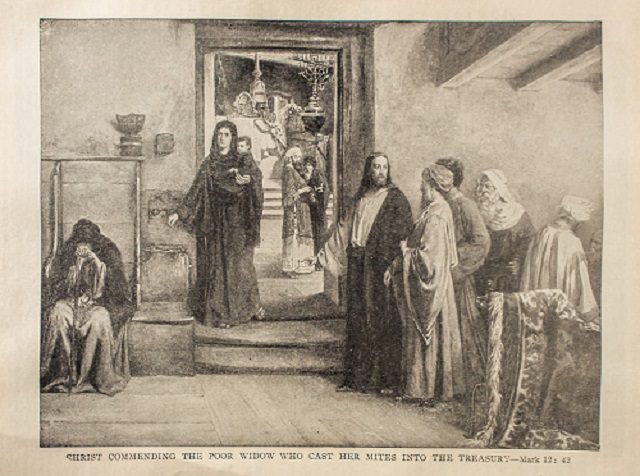
(11-1-09)
*****
This is a follow-up to my earlier paper: “Biblical Evidence Against Tithing and in Favor of Progressive Giving According to Ability.”
* * * * *
God commands us to give: and quite a bit. Of course we must follow His commands. I don’t see in the New Testament, however, anywhere where the tithe (a straight 10% figure for everyone: as if it were a straight tax) is commanded. Perhaps someone can direct me to such a passage. I’ve yet to see it.
Rich folks ought to give a great deal more than 10% and the poor woman who gave a penny (everything she had) gave 100%. People can also donate time or have many children. Time is money. I believe it is imperative to give to God: to support the Church, etc. I disagree that it is a requirement of 10% for all, because that’s not taught in the New Testament (far as I can tell).
Where is mandatory tithing for everyone taught in the New Testament? And no one can find it, why is it that folks have this view in the first place? Assuming I am correct and it isn’t there, wouldn’t it then be the case that this is an unbiblical tradition of men? One could try to build a case based on Old Testament Mosaic Law passages, but then it is a huge task to explain why tithing is still in force while many other laws are not, and to establish a criterion to explain that difference of application.
The Old Testament required a lot of things: Saturday Sabbath worship, circumcision, all the dietary laws. Those are three clear examples of things that changed. But they weren’t annihilated; they were developed in a Christian fashion. The Sabbath became Sunday worship because of the Resurrection. Circumcision was developed into baptism: a sort of initiation rite. The dietary laws no longer applied after Peter had a vision and God declared all foods clean.
Tithing is another instance of the same thing. I have argued that New Testament monetary teaching is even more difficult to follow than the old tithe, because it involves (far as I can tell) a progressive notion of giving: rich people would have to give more out of their great abundance, and poor people less. All needs are supposed to be provided. That would obviously place more responsibility on the relatively well-to-do members of the congregation.
In Matthew 23:23 (cf. Lk 11:42 and see also Lk 18:12: the rich young ruler) Jesus assumed His hearers (the Pharisees) were tithing because they were still observing the Mosaic Law. But the New Covenant superseded that and developed it in different directions. The new thing wasn’t about legalism but about joyfully serving Christ from the heart. So giving financially, like everything else, involved a deeper understanding than was available previously.
It’s not like now we don’t have to give. According to what I understand New Testament teaching to be, most of us (predominantly middle class) would have to give a lot more than just a tithe. It’s the giving that continues; the only thing that has changed is the legalistic requirement of 10% for everyone. Giving from the heart or out of abundance, or all one has: none of those scenarios fit into a rigid 10% figure.
The New Covenant is not about laws but about relationship and the Holy Spirit and 100% commitment to following Jesus as a disciple; from the heart. So it goes beyond tithing. If tithing were still required, it surely would have been spelled out in the New Testament. But it is not. So it is very reasonable to assume that it is no longer in force, as with most of the legalistic Old Testament requirements.
The spirit of the law is still in force: just applied differently. Hence Jesus stated in His Sermon on the Mount (Matthew 5:17-18): “Think not that I have come to abolish the law and the prophets; I have come not to abolish them but to fulfil them. For truly, I say to you, till heaven and earth pass away, not an iota, not a dot, will pass from the law until all is accomplished.”
God provides. He doesn’t do so because of a rigid percentage figure, but according to need and how much a person is following God wholeheartedly (or even if they are not; in His unfathomable mercy). I know God provides, believe me, from my own experience. I’ve been doing this apologetics work full-time now for almost eight years. I don’t have the benefit of TV, radio (not very often, anyway), or lectures around the country. It’s just my books, my staff job at the Coming Home Network as Internet Forum Coordinator and Moderator, and whatever donations happen to come in (usually very few).
I have four children, a mortgage, and we manage to be almost debt-free (except for the mortgage), to have a good credit rating, and even take a pretty decent vacation every year. Our needs are met. We know that God does that by various means. Our task is to serve Him and trust that needs are met, as long as we are working responsibly and not trying to avoid work or something of that sort.
I didn’t believe in the tithe as a Protestant and I don’t now, because I don’t see it taught in the New Testament. I believe in progressive giving, voluntarily, radically, from the heart. I think we are our brother’s keepers. And I believe that those who don’t have a lot of money can serve others in ways that are the equivalent of giving funds. For example, I’m not loaded, but I could help for two entire days at our parish’s Oktoberfest, which is our biggest fundraiser. Time is money. If I work there eight hours for nothing, that is free labor, and is the equivalent of giving them a check. And my children want to help, so we multiply the man-hours volunteered.
I don’t have much disposable income (unless we wipe out our vacation, which we all regard as absolutely necessary, spiritually and psychologically: a sort of “Sabbath” for the year). I get my main royalties twice a year. Pretty soon the mid-year ones will be exhausted and it’ll get very lean around here again. But I can write and try to do what I can to help people that way, and I can volunteer my time.
My wife does things like spend hours and days on end helping my dying father and my mother (so that she is emotionally exhausted now and trying to recover and gain her equilibrium again), and her usual home-schooling of our children. That is the Lord’s work. It goes far beyond just a 10% cut from our income. We do that with secular government. The Christian walk goes way beyond that.
I think a lot of the reason that tithing is taught in many churches is that it is a legalistic requirement that gets people to give who otherwise would not, from the heart, and generously. It’s pragmatism introduced into Christian circles, for fundraising purposes. People fall short, so a legalistic scheme is utilized in order to raise funds. But I think it is wrong for a church to require something of this nature that is contrary to the New Testament. There is plenty of New Testament teaching about finances and donations and giving and generosity (as seen in my earlier paper above). But tithing is not one of them.
Churches ought to apply New Testament teaching on money rather than revert to Old Testament legalism in an effort to raise funds. They ought to raise the “monetary bar” rather than lower it and adopt techniques that may work (pragmatically), but are of dubious pedigree in terms of what the New Testament actually teaches. Tithing is fine as a voluntarily adopted policy of an individual; just not as a mandatory requirement; as if the New Testament teaches that.
*****
Meta Description: Tithing is fine as a voluntarily adopted policy of an individual; just not as a mandatory requirement.
Meta Keywords: almsgiving, charitable giving, charity, church offering, financial support of the church, passing the plate, progressive giving, tithing, widow’s mite












